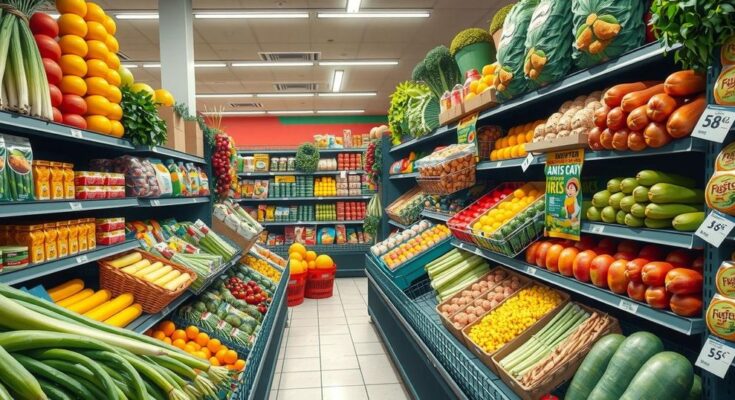South Africa’s food sector is set for changes as economic recovery indicators emerge, such as lower interest rates and GDP growth. While food producers may improve margins, retailers could benefit from a projected rise in food price inflation. Shoprite reports significant growth, whereas Spar and AVI show challenges, and Tiger Brands expresses optimism for future performance.
The South African food sector stands to undergo significant transformation as the economy shows signs of recovery, spurred by lower interest rates, improving GDP growth, and potential cash injections from the new two-pot retirement system. This environment is expected to enhance consumer spending, yet the question remains: will food producers or retailers benefit more?
With expectations of improved consumption and food sector volumes due to the anticipated economic recovery, food producers are likely to experience better margins and earnings. However, a rise in food price inflation projected for Q1 2025 may favor food retailers, who historically perform better in such environments due to anticipated growth in relative earnings.
Shoprite’s RSA Supermarkets have reported a commendable 10.4% growth in revenue without increasing promotional costs amidst a low inflationary landscape. This achievement results from leveraging new loyalty partnerships and store expansion. Even with slowed like-for-like growth from 8% to 5.4%, the significant volume growth sustains the positive performance metrics. Shoprite’s balance sheet remains strong, expected to improve further post a proposed R2.7 billion furniture sale, making it a high-quality investment.
Conversely, Spar has experienced challenges, with its recent 18-week trading update reflecting disappointing revenue growth trends in both South Africa and Ireland. Achieving 3.4% revenue growth, the company faced setbacks due to the planned closure of 13 grocery stores and insufficient promotions. Nevertheless, improvements in operational efficiency, coupled with the closure of underperforming stores, indicate a potential pathway for recovery moving forward.
AVI’s first half results reveal a 9% year-on-year increase in headline earnings per share. However, the group’s overall revenue growth was only at 1%, with unexpected underperformance from major divisions. Management has cautioned that profit growth could slow in the coming months due to prevailing market conditions, signaling a measure of uncertainty. Despite this, AVI remains a reputable long-term investment option given its history of delivering solid returns.
Finally, Tiger Brands demonstrated resilience with a 3% revenue increase for the four months ending January 31, attributed to strategic initiatives aimed at cost reduction. The company is optimistic about the consumer environment improving, evidenced by its ongoing portfolio optimization efforts, which include selling a substantial stake in the Chilean food producer, Empresas Carozzi. Management anticipates continued focus on volume and profit as vital growth areas.
In conclusion, as South Africa’s food sector adapts to economic recovery, food retailers are well-positioned to capitalize on anticipated consumer spending amidst fluctuating inflation levels. While Shoprite exhibits strong growth, Spar faces challenges that necessitate reevaluation. AVI’s cautious outlook highlights the unpredictable nature of the market, yet Tiger Brands maintains a positive future perspective. Overall, the evolving dynamics suggest that food retailers may emerge as the primary beneficiaries in this period of recovery.
Original Source: www.zawya.com




